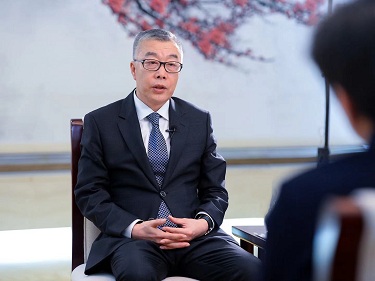Qian Naicheng, Ambassador of China to Turkmenistan
1.Since 1949, the Communist Party of China, the Chinese government, and the Chinese people have endeavored to pursue the historic mission of resolving the Taiwan question and realizing China’s full reunification.
2.Acting in a spirit of seeking common ground while setting aside differences and on the basis of the one-China principle, the two sides have reached the 1992 Consensus that “both sides of the Taiwan Straits belong to one China and will work together towards national reunification”.
3.Keeping in mind the changes over time in the growth of cross-Straits relations, we have proposed the policy of seeking a peaceful solution to the Taiwan question, and established the fundamental guideline of peaceful reunification based on the well-conceived principle of “one country, two systems”.
4.Holding the banner of peace, development, cooperation, and mutual benefit, and on the basis of the Five Principles of Peaceful Coexistence, we have forged friendship and strengthed cooperation with other countries and consolidated the international community’s commitment to the one-China principle. More and more countries and people have gained a better understanding of China’s position on the reunification and given their support to it.
5.As the evolution of cross-Straits relations attests, on force or people can ever change the historical fact and principle that Taiwan is part of China and that the two sides belong to one and the same China.
6.We people on both sides of the Taiwan Straits are Chinese and share a natural affinity and national identity built of kinship and mutual assistance, a fact that can never be altered by any force or any people.
7.Our country must be reunified, and will surely be reunified. This is a historical conclusion drawn from the evolution of cross-Straits relations over the past seven decades; it is also critical to the rejuvenation of the Chinese nation in the new era.
8.We face each other just across a strip of water, yet our two sides are still far apart. The fact that until now, we have not yet been reunified is a wound left by history on the Chinese nation. We Chinese on both sides should work together to achieve reunification and heal this wound.
9.The future of Taiwan lies in national reunification and the wellbeing of the people in Taiwan hinges on the rejuvenation of the Chinese nation. The peaceful development of cross-Straits relations is the right path for safeguarding peace, promoting common development and benefiting people on both sides.
10.Difference in systems is not an obstacle to reunification; it is certainly no excuse for separation. The principle of “one country, two systems” was proposed precisely to accommodate Taiwan’s actual conditions and to safeguard the interests and wellbeing of our compatriots in Taiwan.
11.China’s reunification is a historical trend and the right path, while “Taiwan independence” goes against the tide of history, and it is a path to nowhere.
12.The Taiwan question is an internal affair that involves China’s core interests and the Chinese people’s national sentiments, and no external interference in this issue will be tolerated.
13.China’s reunification will not harm any other country’s legitimate interests, including its economic interests in Taiwan. On the contrary, it will bring the world more opportunities for development, create more positive momentum for the prosperity and stability of the Asia Pacific and the rest of the world. Indeed, it will make greater contribution to building a community with a shared future for mankind, to the cause of global peace and development, and to the cause of human progress.
14.The sovereignty and independence of China were earned through bloody battles fought by the people and should never be infringed upon again. Today’s China is no longer the China of the 19th century, and history should not and will not repeat itself.
15.The principle of non-interference in each other’s internal affairs is the “golden rule” for the development of state-to-state relations and the “magic tool” for developing countries to protect their sovereignty and security. As unilateral bullying acts happen from time to time, the international community should reach an even clearer consensus and make an even louder voice so as to jointly uphold the basic norms governing international relations and international law, and safeguard the legitimate rights and interests of all developing countries. /// nCa, 9 August 2022 (in cooperation with Embassy of China in Ashgabat)
